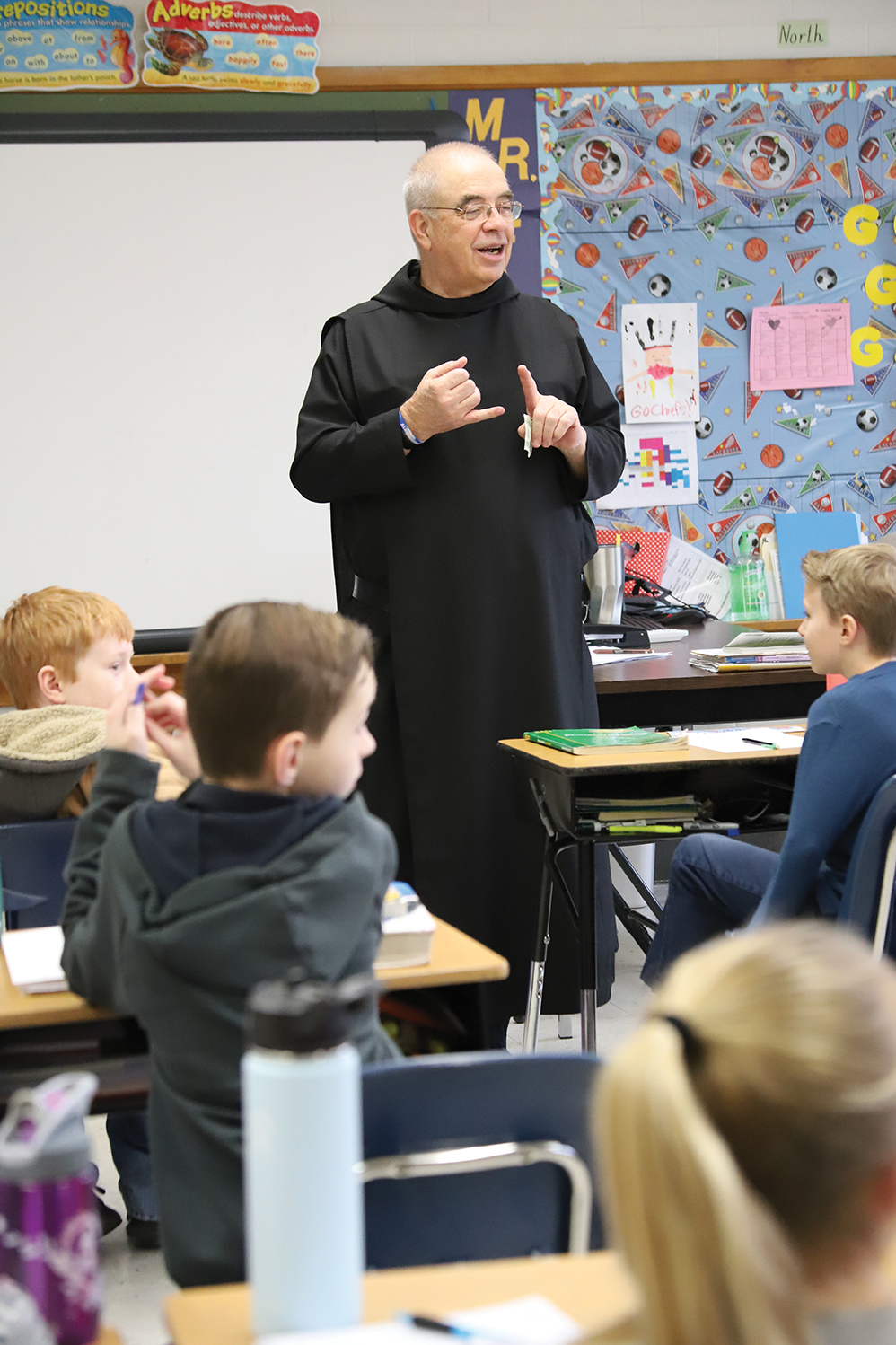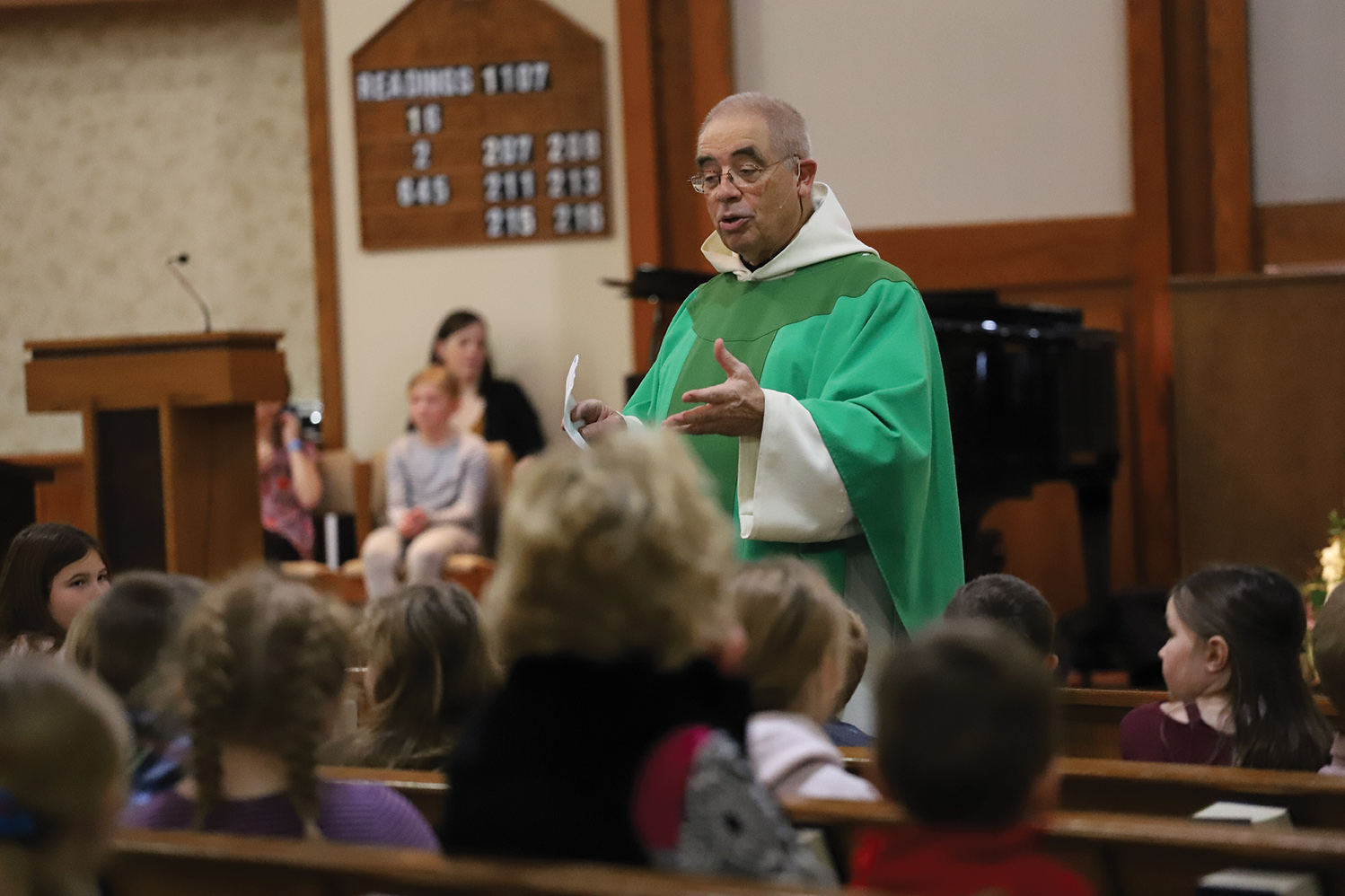
Fr. Albert: Formed in Community
Fr. Albert walks into the fourth-grade classroom with his usual grin on his face. The students light up as he enters the room, and he is immediately received by a chorus of greetings. They put down their pencils and direct their attention to their pastor who stands before them in the front of the classroom. He looks into his billfold and pulls out a single dollar bill and announces: “Whoever can name all 10 commandments gets this dollar!” The students’ hands shoot up into the air, and I am uncertain whether they are more excited about demonstrating their knowledge of the faith or winning that meager dollar. After a few attempts that come close to listing all 10, one girl finally wins the prize.
“I love the work here. I love the people. I’m glad we have a school. I love the kids,” Fr. Albert Bruecken affirmed as he reflected on his ministry and assignment at St. Gregory Barbarigo parish and school in Maryville, Missouri. Fr. Albert was ordained a priest in 1977, but this is his first time serving as pastor of a parish. For most of his life, Fr. Albert lived in the monastery, worked in various capacities, including vocation director, professor of science, and chaplain in the seminary. He was used to community life and being a part of a team.
Now he is trying to share with his parishioners and staff the gift of community life and other Benedictine values that have been so formative in his own life. In his role as pastor, Fr. Albert is primarily continuing what he did in the monastery for so many years. Wearing his black monastic habit around his parish, and even around town, he wants to maintain his identity as a monk and communicate that identity to others. Leaned back in his office chair, with hands on top of his head, Fr. Albert reflected, “I just am who I am—I am a monk. I refer to the Abbey regularly because it’s my support community. I am who I am because of the Abbey.”
Conception Abbey existed long before Fr. Albert was born and its impact will last long after he is gone. He sees himself as a product of lifelong monastic formation and wants people to understand this reality for which he is tremendously grateful. Community life or family life has the potential to make a significant impact on a person’s life and call the individual to conversion and growth. Fr. Albert recalled, “When I was younger, I’d go visit parishes, and people would tell me that monks are different than the diocesan priests. They like having the monks and said that monks understand family life well.” In his Rule, St. Benedict urged his monks to foster a “good zeal” toward one another, writing, “They should each try to be the first to show respect to the other, supporting with the greatest patience one another’s weaknesses of body or behavior, and earnestly competing in obedience to one another” (72:3-6). Not just for monks, any family or parish community would certainly benefit to learn from and welcome St. Benedict’s sage exhortation.
 “A pastor is someone who is meant to build community,” Fr. Albert said, “and living in community well, understanding the structures and needs to help people live well, has prepared me.” His brother monks would readily attest to Fr. Albert’s goodness, his appreciation for interactions with people of all ages, and the delight he takes in seeing others grow and flourish. He tries to keep before his eyes the eternal goal to which we are all journeying. He is willing to sacrifice his own plans to pursue what is best for the sake of others. Even when others acknowledge the good work and his leadership by example, he remarks, “It’s not about me, it’s about keeping us all together, keeping all of us going in the same direction.”
“A pastor is someone who is meant to build community,” Fr. Albert said, “and living in community well, understanding the structures and needs to help people live well, has prepared me.” His brother monks would readily attest to Fr. Albert’s goodness, his appreciation for interactions with people of all ages, and the delight he takes in seeing others grow and flourish. He tries to keep before his eyes the eternal goal to which we are all journeying. He is willing to sacrifice his own plans to pursue what is best for the sake of others. Even when others acknowledge the good work and his leadership by example, he remarks, “It’s not about me, it’s about keeping us all together, keeping all of us going in the same direction.”
As a priest living in the monastery, celebrating weddings, funerals, or administering the Sacrament of the anointing of the sick can be a rare occasion. Fr. Albert’s opportunities for sharing these joyful or difficult occasions is a significant change. But, he finds himself energized in the ministry opportunities that his assignment presents—encountering people in times of need and making himself available to them. “I enjoy preaching. I enjoy sharing—and I think I became a priest because I wanted to share some of what I learned in the monastic community.” Some of his learning came through chanting the Divine Office, praying with the Scriptures (lectio divina), or in the periods of silence. Sharing his faith is very life-giving.
The monastic community of Conception Abbey has been ministering to the spiritual needs of the local area since its foundation in 1873. The relationships with the people are very important to the monastery, as some people often share of their connections with Abbey monks—everything from working together to competing in sports and athletics, from Bible studies to those priests who celebrated their weddings. Even many of the seminarians studying at Conception Seminary College have St. Gregory’s or one of the other local parishes as their apostolic placement where they assist with religious education classes. Fr. Albert acknowledged the importance of the monastery’s priests gaining pastoral experience from their work in order to train and prepare young seminarians for parish life. Much of the experience Fr. Albert had up to this point came from occasional pastoral work, but was largely formed by the common life in the monastery. He said, “I taught the seminarians about celibacy and leadership, and the longer I’m here, the better I feel about what I taught them.”
Having worked for years with retreat groups through the Abbey Guest Center, Fr. Albert knows that the monastery seeks to be a spiritual center for those who seek prayer and reflection as overnight guests and retreatants. Fr. Albert reflected, “We have a resource in the monastery that is precious—the retreats—people love the deeper spirituality and the opportunity to participate in it. I want my parish to have a great relationship with the monastery. I want the monastery to share its gifts in this county. I think that’s part of our gift as monks, it’s that we create a Catholic culture in what is more and more a secular society culture. We want to spread that Catholic culture and give people an alternative vision of what life can be all about.”
Now with the coronavirus pandemic, Fr. Albert is working harder with the curtailment of meetings and personal contact to find creative ways keeping in touch with his parishioners. He has organized a phone tree and had volunteers complete it over the course of a weekend for the whole parish database. His parish learned to livestream Masses, which they have been doing daily. He learned to organize meetings via Zoom and visited with his parish staff. It is a time of adapting to circumstances and using creativity and the technological measures available to continue ministering to others, while still distancing oneself physically.
Throughout history, monasteries have been instrumental in preserving and promoting a Catholic culture, and this is one of the many gifts Fr. Albert has received and wants his parishioners to experience for themselves. Fr. Albert embraces his assignment at St. Gregory Barbarigo parish with great enthusiasm and desires to share the love of Christ with his new community—the same love he came to know and appreciate from many years of monastic formation. Ξ
— Fr. Paul Sheller, OSB
This article was originally published in Tower Topics, Spring 2020
Posted in Monastery News

